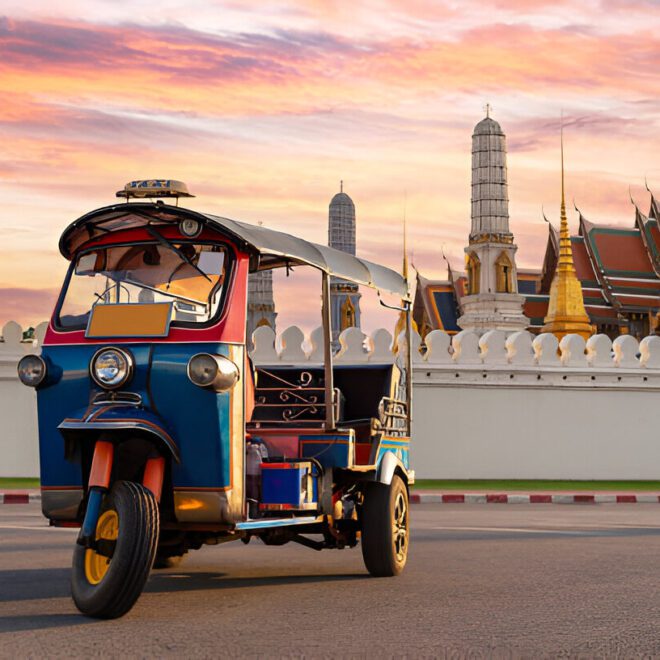Let’s start with the most important fact: Bangkok is an overwhelmingly safe city, filled with kind, honest, and welcoming people. The vast majority of visitors and residents have nothing but positive experiences. However, like any major global city that attracts millions of tourists, there are a handful of opportunistic individuals who run well-known scams. Being aware of these is not about being scared; it’s about being smart, confident, and prepared.
Knowing how to spot the red flags of the most common scams in Bangkok is the key to ensuring your time here is incredible. This guide is your friendly, no-nonsense look at the classic tricks, from tuk-tuk diversions to gem store hustles. Think of this as your street-smart companion, designed to empower you so you can relax and enjoy everything this amazing city has to offer.
Why Trust This Guide?
As a long-time resident of Bangkok, I’ve seen these scams play out hundreds of times. I’ve personally had to step in and help a lost-looking tourist who was being told the Grand Palace was closed for a “special ceremony,” and I’ve advised countless friends and clients on how to handle a taxi driver who refuses to use the meter. This guide is built on that direct, real-world observation. It’s not designed to frighten you, but to give you the same practical, confident awareness that locals have, so you can navigate the city with ease and peace of mind.
The Golden Rule: If It Seems Too Good to Be True…
This is the number one rule for staying safe anywhere in the world, and it’s especially true in Bangkok. Unbelievably cheap tours, “secret” government-run gem sales, or a tuk-tuk ride across the city for only 20 baht—these are all major red flags. Trust your intuition. If a deal feels suspicious, politely decline and walk away.
Common Scams in Bangkok at a Glance
| Scam Name | Primary Location | How to Avoid It |
|---|---|---|
| The “Grand Palace is Closed” Scam | Near major temples | Ignore them, check official hours online |
| The Tuk-Tuk Scam | Tourist-heavy areas | Agree on a price beforehand, refuse shop detours |
| The Gem & Tailor Scam | Linked to Tuk-Tuk Scam | Never buy gems or suits from a referred shop |
| The Metered Taxi Scam | Everywhere | Insist on the meter (“meter on”) before getting in |
| The Klong (Canal Boat) Tour Scam | Near river piers | Book with official ticket counters, not touts |
| The Patpong Bar Scam | Patpong Night Market | Avoid bars with aggressive promoters |
| The Bird Food / Pigeon Scam | Sanam Luang, public squares | Politely refuse offers to buy bird food |
| The “Friendly Local” Scam | Tourist areas | Be polite but wary of unsolicited help |
| The Motorbike Rental Scam | Everywhere (especially islands) | Take detailed photos of the bike before renting |
| The Wrong Change Scam | Convenience stores, taxis | Pay with smaller bills, count your change |
Scams Around Major Tourist Attractions
These scams are most common around Bangkok’s famous temples and landmarks.

The “Grand Palace is Closed” Scam
This is perhaps the most famous scam in Bangkok. A friendly, often well-dressed local will approach you near the entrance to the Grand Palace or Wat Pho and inform you that it’s “closed for a special Buddhist ceremony” or for “cleaning.” They will then offer to take you on a “special” one-day-only tour of other “open” temples via their tuk-tuk friend. The goal is to get you into a tuk-tuk that will take you to gem and tailor shops.
- How to Avoid It: The Grand Palace is almost never closed during opening hours. Ignore these people completely. Politely say “no, thank you” and continue walking to the official entrance. Always check the official opening times online beforehand.
The Klong (Canal Boat) Tour Scam
Near the river piers (like Saphan Taksin), you may be approached by touts offering a private long-tail boat tour of the canals (klongs) for an exorbitant price. They might show you a “map” and quote a price per person that seems reasonable, but the final bill will be much higher.
- How to Avoid It: Always go to the official ticket counters for the Chao Phraya Express Boat or a reputable tour operator. Never book a tour with a random individual on the street. For a more authentic experience, use the public canal boats (like the Saen Saep line) for a fraction of the price.
Speak Thai with Confidence: An Essential Guide
Our 2026 guide makes it easy, with 100 crucial phrases for daily life, covering everything from greetings and ordering food to navigating transport.
The Bird Food / Pigeon Scam
In public squares, particularly Sanam Luang near the Grand Palace, someone may approach and place a bag of corn or bird food in your hand. As soon as you accept it, a flock of pigeons will descend, and the person will then aggressively demand an inflated payment for the food.
- How to Avoid It: Simply keep your hands to yourself and politely but firmly say “no, thank you” (mai ao, krap/ka) to anyone offering you anything for free in these areas.
The “Friendly Local” Scam
While most locals are genuinely friendly, this scam involves someone who is overly friendly approaching you and saying they want to “practice their English” or are a “student.” They will quickly steer the conversation towards a fantastic “deal” or “special event” happening today only, which inevitably leads you to a tuk-tuk and the gem or tailor scam.
- How to Avoid It: Be polite, but be wary of any unsolicited “help” or conversation that quickly turns into a sales pitch. It’s best to seek out information from official sources like a Tourist Information office, not from random people on the street.
Transportation Scams: Getting Around Safely
Navigating Bangkok’s traffic is part of the experience. Here’s how to do it without getting ripped off.

The Tuk-Tuk Scam (Overcharging & Forced Shopping Trips)
The classic tuk-tuk ride can be fun, but it’s also a common source of scams. The most frequent issue is a driver offering a ridiculously cheap city tour (e.g., 20-40 THB). This is not a real tour. The driver is paid a commission to take you to a series of gem shops, tailor shops, and souvenir stores where you will be subjected to high-pressure sales tactics.
- How to Avoid It: For a simple A-to-B journey, always agree on a clear, firm price before you get in. For a 10-15 minute ride, 100-150 THB is a reasonable starting point for negotiation. Unequivocally refuse any and all suggestions to visit shops. If the driver insists, get out.
The Metered Taxi Scam
By law, all taxis in Bangkok must use the meter. However, some drivers in tourist areas will refuse and try to quote a high flat rate. Another common trick is taking a very long, indirect route to run up the meter.
- How to Avoid It: When you get in, simply say “meter, krap/ka.” If the driver refuses or shakes their head, get out and find another taxi. For route concerns, have Google Maps open on your phone so you can track the journey. Using a ride-hailing app like Grab avoids this problem entirely.
The Motorbike Rental Scam
While more common on the islands like Phuket or Samui, this scam also exists in Bangkok. You rent a motorbike, and when you return it, the owner points out pre-existing scratches or damage and demands an exorbitant amount for repairs, sometimes holding your passport as collateral.
- How to Avoid It: Before you rent the bike, take a detailed video and multiple photos of it from every angle, pointing out any existing scratches or damage with the owner present. Ensure they see you documenting it. Rent only from reputable, well-reviewed shops.
Shopping & Entertainment Scams
These scams prey on the desire for a good deal or a wild night out.

The Gem & Tailor Scams
These are almost always linked to the tuk-tuk scam. The driver takes you to a shop where a smooth-talking salesperson will try to sell you “valuable” gems or a “24-hour” bespoke suit. The gems are often fake or worthless, and the suits are of terrible quality.
- How to Avoid It: Simple. Never, ever buy gems or suits from a shop a tuk-tuk driver takes you to. If you want to buy jewelry or get clothing tailored, do your own research and go to a reputable, long-standing establishment.
The Patpong Bar Scam
In the Patpong entertainment district, you may be aggressively lured into a bar with promises of a “free” ping-pong show and cheap drinks. Once inside, you will be presented with a massively inflated bill, and intimidating staff will pressure you into paying.
- How to Avoid It: Be extremely wary of any bar with aggressive promoters on the street. Do not enter any establishment that you feel pressured to go into. Stick to well-known, reputable bars or go with a local who knows the area.
The Wrong Change Scam
This is a simple but common trick in places that deal with a lot of cash, like convenience stores or taxis. When you pay with a large bill (like a 1,000 THB note), the cashier or driver will quickly return change for a smaller bill, hoping you won’t notice.
- How to Avoid It: Try to pay with smaller bills whenever possible. When paying with a large note, say the amount out loud (e.g., “one thousand baht”). Always count your change carefully before you walk away from the counter or exit the taxi.
Who to Contact if You Need Help
If you do find yourself in trouble, do not hesitate to contact the Tourist Police. They are a dedicated division of the Royal Thai Police and are experienced in assisting foreigners.
- 24-Hour Hotline: 1155
- Website: https://touristpolice.go.th/
Frequently Asked Questions
Is Bangkok a safe city for tourists?
Are tuk-tuks always a scam?
What should I do if I think I'm being scammed?
Is it safe to use my credit card in Bangkok?
How do I report a crime in Bangkok?
References
For more official travel advice and safety information, we recommend these trusted external sources:
- U.S. Department of State – Thailand Travel Advisory: Provides official safety and security information for American citizens traveling to Thailand, including notes on common scams. https://travel.state.gov/content/travel/en/international-travel/International-Travel-Country-Information-Pages/Thailand.html
- UK Foreign, Commonwealth & Development Office – Thailand Travel Advice: The official source of travel advice for British nationals, offering practical tips on staying safe and avoiding trouble in Thailand. https://www.gov.uk/foreign-travel-advice/thailand
- 25 Best Dim Sum in Bangkok: The Ultimate 2026 Guide - 10/02/2026
- 10 Best International Moving & Relocation Companies 2026 - 31/01/2026
- 20 Best Indian Restaurants in Bangkok (2026 Guide) - 26/01/2026




